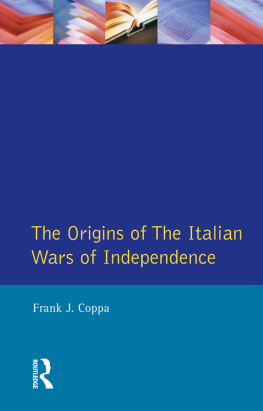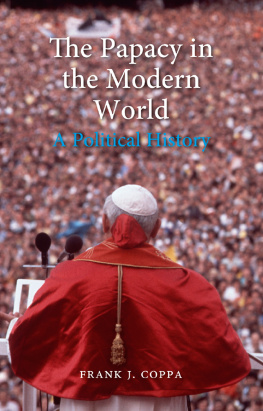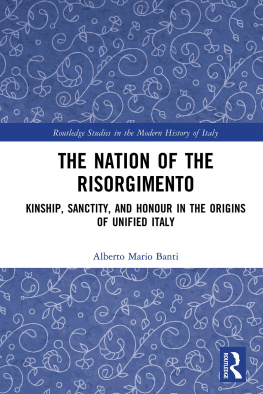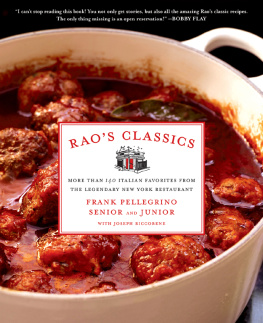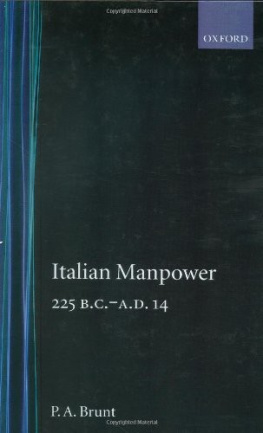Frank J. Coppa - The Origins of the Italian Wars of Independence
Here you can read online Frank J. Coppa - The Origins of the Italian Wars of Independence full text of the book (entire story) in english for free. Download pdf and epub, get meaning, cover and reviews about this ebook. year: 2014, publisher: Routledge, genre: Science. Description of the work, (preface) as well as reviews are available. Best literature library LitArk.com created for fans of good reading and offers a wide selection of genres:
Romance novel
Science fiction
Adventure
Detective
Science
History
Home and family
Prose
Art
Politics
Computer
Non-fiction
Religion
Business
Children
Humor
Choose a favorite category and find really read worthwhile books. Enjoy immersion in the world of imagination, feel the emotions of the characters or learn something new for yourself, make an fascinating discovery.
- Book:The Origins of the Italian Wars of Independence
- Author:
- Publisher:Routledge
- Genre:
- Year:2014
- Rating:5 / 5
- Favourites:Add to favourites
- Your mark:
- 100
- 1
- 2
- 3
- 4
- 5
The Origins of the Italian Wars of Independence: summary, description and annotation
We offer to read an annotation, description, summary or preface (depends on what the author of the book "The Origins of the Italian Wars of Independence" wrote himself). If you haven't found the necessary information about the book — write in the comments, we will try to find it.
The Origins of the Italian Wars of Independence — read online for free the complete book (whole text) full work
Below is the text of the book, divided by pages. System saving the place of the last page read, allows you to conveniently read the book "The Origins of the Italian Wars of Independence" online for free, without having to search again every time where you left off. Put a bookmark, and you can go to the page where you finished reading at any time.
Font size:
Interval:
Bookmark:
THE ORIGINS OF THE ITALIAN WARS OF INDEPENDENCE
ORIGINS OF MODERN WARS
General editor: Harry Hearder
Titles already published:
THE ORIGINS OF THE FRENCH REVOLUTIONARY WARS
T. C. W. Blanning
THE ORIGINS OF THE ITALIAN WARS OF INDEPENDENCE
Frank J. Coppa
THE ORIGINS OF THE WARS OF GERMAN UNIFICATION
William Carr
THE ORIGINS OF THE RUSSO-JAPANESE WAR
Ian Nish
THE ORIGINS OF THE FIRST WORLD WAR (Second Edition)
James Joll
THE ORIGINS OF THE SECOND WORLD WAR IN EUROPE
P. M. H. Bell
THE ORIGINS OF THE SECOND WORLD WAR IN ASIA AND THE PACIFIC
Akira Iriye
THE ORIGINS OF THE KOREAN WAR
Peter Lowe
THE ORIGINS OF THE VIETNAM WAR
Anthony Short
THE ORIGINS OF THE ARAB-ISRAELI WARS (Second Edition)
Ritchie Ovendale
THE ORIGINS OF THE ITALIAN WARS OF INDEPENDENCE
Frank J. Coppa

First published 1992 by Longman Group Limited
Published 2013 by Routledge
2 Park Square, Milton Park, Abingdon, Oxon OX14 4RN
711 Third Avenue, New York, NY 10017, USA
Routledge is an imprint of the Taylor & Francis Group, an informa business
Copyright 1992, Taylor & Francis.
All rights reserved. No part of this book may be reprinted or reproduced or utilised in any form or by any electronic, mechanical, or other means, now known or hereafter invented, including photocopying and recording, or in any information storage or retrieval system, without permission in writing from the publishers.
Notices
Knowledge and best practice in this field are constantly changing. As new research and experience broaden our understanding, changes in research methods, professional practices, or medical treatment may become necessary.
Practitioners and researchers must always rely on their own experience and knowledge in evaluating and using any information, methods, compounds, or experiments described herein. In using such information or methods they should be mindful of their own safety and the safety of others, including parties for whom they have a professional responsibility.
To the fullest extent of the law, neither the Publisher nor the authors, contributors, or editors, assume any liability for any injury and/or damage to persons or property as a matter of products liability, negligence or otherwise, or from any use or operation of any methods, products, instructions, or ideas contained in the material herein.
ISBN 13: 9780-582040458 (pbk)
British Library Cataloguing-in-Publication Data
Coppa, Frank J.
The origins of the Italian wars of independence
(Origins of modern wars)
I. Title II. Series
Library of Congress Cataloging-in-Publication Data
Coppa, Frank J.
The Origins of the Italian wars of independence / Frank J. Coppa
p. cm. (Origins of modern wars)
Includes bibliographical reference and index.
ISBN 0582040469. ISBN 0582040450 (pbk.)
1. ItalyHistory18491870. I. Title. II. Series.
DG552.6.C67 1992
945.083 dc20
Contents
Of the nine volumes already published in this series, seven have dealt with twentieth-century wars, one with an eighteenth-century war, and only one with a nineteenth-century war. This, the tenth volume in the series, does something to fill the gap, and is a fine complement to Professor William Carrs Origins of the Wars of German Unification. The nineteenth century was, of course, rather more peaceful than the seventeenth, eighteenth or twentieth, centuries but if the wars between 1815 and 1914 were comparatively limited in time and space they were nevertheless immensely important, and to study their causes in the context of the series as a whole provides a fascinating exercise.
Professor Frank Coppa brings high qualifications to the task of studying The Origins of the Wars of Italian Independence. His studies of Pius IX and Cavour are well known to students of nineteenth-century Italy, and his more recent study of Cardinal Antonelli should refine historical understanding of a figure whose role has been viewed in an over-simplified manner in the past. It is precisely from his work in the Vatican archives that Professor Coppa brings a new angle on the approaches to the wars of Italian independence. In 1848 Pio Nono, with his plans for an Italian customs union, was recommending a different policy from Piedmonts war plans, but a policy which was rejected by Carlo Alberto. That rejection was one reason for the Piedmontese wars and defeats in 1848 and 1849.
The new material which Coppa has unearthed in the Vatican archives shows that the Pope was more enthusiastic for the Austrians to leave Italy in 1848 than is usually realized, even though he would not countenance the idea that he might himself go to war with Austria. In particular, Monsignor Corboli Bussi, who carried out much of the Popes diplomacy for him, emerges as a pretty full-blooded Italian nationalist. The 1848 war was one of nationalist enthusiasm on the Italian side an ideological war. This becomes clear when it is remembered that troops from Piedmont, Tuscany, the Papal States and Naples, as well as Garibaldis volunteers and the Milanese revolutionaries were all fighting together against Austria. The attitude of the Italian monarchist rulers was, of course, ambiguous, and depended upon the degree to which they in the case of the Pope, the King of Naples and the Grand Duke of Tuscany were in the grip of revolutionary forces, or in the case of Carlo Alberto -feared revolution. But Coppas account provides evidence to suggest that perhaps they were all (even Ferdinando of Naples) more sympathetic to the Italian cause than is usually assumed.
The Second War of Italian Independence, in 1859, was in one respect motivated less by ideological aims than that of 1848 had been. It is true that Napoleon III spoke of fighting for the principle of nationality, but it would be a brave historian who would define precisely what the Emperors motives were. Perhaps he did not have a clear idea of them himself. He would have liked to drive the Austrians out of Venice as well as Lombardy, and before the Third War of Italian Independence he was still deeply preoccupied with the acquisition of Venice for Italy. But he also wanted France to be rewarded with the acquisition of Savoy and Nice, even though Nice was undeniably more Italian than French.
Cavours motives in 1859 were even less those of an ideologue than Napoleons. He too wanted, of course, to drive the Austrians out of Italy, but in order to make Piedmont the dominant state in Italy rather than to unite the whole peninsula. His motives may be described as patriotic rather than nationalist. He was not working for nationalism in any ideological or general sense. While Napoleon gave diplomatic support to Romanian nationalism in these years, Cavour speculated with the idea of handing the Romanian Principalities over to Austria in compensation for an Austrian retreat from Italy. It is undeniably true that the two men planned a blatantly aggressive war at Plombires in 1858, and the Austrians can be forgiven for believing that they, for their part, fought a defensive and just war.
One interesting theme that Professor Coppa mentions is the idea of the French banker, Pereire, that Austria should sell Venice to Italy for cash, at the end of 1860. Austria, in her turn, might buy Bosnia-Herzegovina from Turkey. Austria was certainly in need of funds, and the market value of the Veneto would probably be higher than that of Bosnia-Herzegovina. The idea was rejected by the Austrians. But Coppa shows us that the Italians later took up the idea of buying Venice. La Marmora, when Italian prime minister, offered Vienna 100,000,000 lire for Venice, but again in vain. Early in the century the Americans had purchased Louisiana from France, and were later to purchase Alaska from Russia. To buy territory seems infinitely more civilized than to fight a bloody war for it, and in a market economy it could be argued that everything has its price. Yet it is an idea that has not caught on in history. The proposals are, of course, only one of the many fascinating points made by Coppa in this scholarly study of the coming of the Italian wars.
Next pageFont size:
Interval:
Bookmark:
Similar books «The Origins of the Italian Wars of Independence»
Look at similar books to The Origins of the Italian Wars of Independence. We have selected literature similar in name and meaning in the hope of providing readers with more options to find new, interesting, not yet read works.
Discussion, reviews of the book The Origins of the Italian Wars of Independence and just readers' own opinions. Leave your comments, write what you think about the work, its meaning or the main characters. Specify what exactly you liked and what you didn't like, and why you think so.

